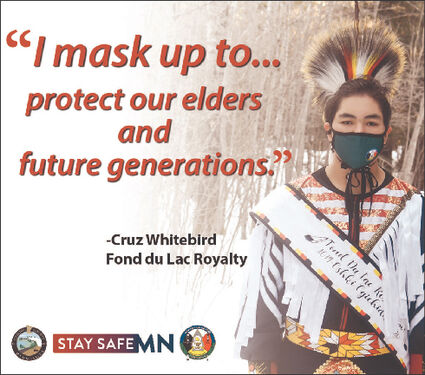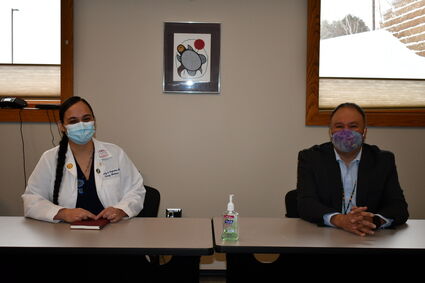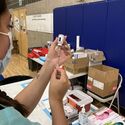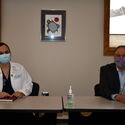Tribe finds Covid successes
Sovereign status helps with collaboration
March 26, 2021

Contributed photo
Ad campaigns were part of the effort to get people to follow social distancing and mask recommendations.
Fond du Lac medical director Dr. Charity Reynolds had trained for public health emergencies as an undergraduate, during medical school and in her residency.
"We trained for public health disasters and pandemics and you're thinking, 'This isn't really going to happen - I won't be in that situation,'" she said. "Then part of my job description when I was hired as medical director was 'if there's ever a pandemic or a health crisis, you'll be called upon.' I didn't expect that within a year of becoming medical director."
The Fond du Lac Human Services and health care staff didn't waste any time reacting to the coronavirus pandemic, meeting and making plans even before Covid-19 made its way to Minnesota.
"That's what those trainings were for and we got to put them to use," Reynolds said. "The biggest thing is having a team and the passion for 'We need to protect the community and what's the best way?' I remember and I still am constantly looking at the CDC and research articles to see what's going on with the coronavirus. How much can we learn and how much can we apply together as a team?"
The most recent numbers tell the story of those successes.
3,835 patients tested.
3,637 negative tests.
196 total positive tests, with 92 on the reservation.
5,260 vaccinations.
Zero deaths - that's correct, there has not been a single death from Covid-19 on the Fond du Lac Reservation since the coronavirus arrived in Carlton County.
The numbers demonstrate that the high rate of vaccinations and low rate of infection on the Fond du Lac reservation aren't occuring by accident.
The success against Covid is the result of careful and extensive planning that began long before the coronavirus officially arrived in the United States, combined with the kind of collaboration that might only be possible in a small sovereign nation such as the Fond du Lac Band of Lake Superior Chippewa and its approximately 4,200 band members.
It's a place where entities usually run by separate bodies outside of the reservation - schools, central government, energy, broadband, health care, mental health, large employers and even convenience stores - all fall under the purview of the Fond du Lac Reservation Business Committee (RBC).
Those entities have learned how important it is to work together and communicate effectively through experience, both in the distant and more recent past.
"We've had some other emergency responses in the community that we've had to come together on that assisted this process. And I think it (the reservation) is on a smaller scale, so we are definitely a little more familiar regarding the areas that have to respond," said FDL Human Services director Samuel Moose.
As of March 18, 2021, Fond du Lac Human Services had reported a cumulative total of 92 positive cases on or near the reservation compared to 1,404 in neighboring (and larger) Cloquet, according to the Minnesota Department of Health.
In the beginning
Before the coronavirus even hit the state of Minnesota, Fond du Lac Human Services had convened a Public Health Emergency Preparedness team - they call it their PHEPs [pronounced "feps"] team - to evaluate the tribe's current "pandemic flu-like illness plan."
"We started meeting periodically and as things got closer to home we started meeting a lot more frequently, a couple times a week," Moose said. "Then as it got to our doorstep in Minnesota, we started meeting daily."
The Reservation Business Council requested a meeting on March 3 to get an update on the human services strategy. The PHEPs team laid out what they knew about the novel coronavirus and what their plans were.
"As the virus reached the United States and started to wreak its havoc, we started having discussions about things that would need to further happen at the tribal level to make sure we were prepared as a tribe," he said.
They talked about community mitigation strategies, what would need to be in place to secure services and businesses, and what services did the tribe provide that were critical in nature that community members needed, including utilities like propane and gas, transportation and more.
"We went through some initial discussion about those types of activities, and then things we understood about pandemic flu-like illness and infection control," Moose said. "It was a pretty in-depth conversation."
On March 13, Moose met with all the tribal division leaders to issue specific guidance and recommendations for business, schools, essential government functions and community mitigation plans that should be considered to address the Covid-19 pandemic. The RBC issued a Declaration of Emergency and activated the Tribe's Emergency Operation Committee (EOC), to begin operationalizing the Covid-19 response tribal-wide and into the community.
The EOC played a big role, Moose said. They helped develop mask guidelines and provided free materials to make them, held food drives and arranged delivery of hot meals and other supplies for elders and children who were at home. They also spent long hours at the EOC command center "monitoring cases, responding to community calls for assistance and emergency, developing plans and meeting with other tribal or state partners" as well as developing policies for emergency leave and extended quarantine hours for employees, according to Moose.
Reynolds said her office looked at all the research and information from the WHO, CDC and the state of Minnesota, then tried to apply that to the Fond du Lac population.
"Our population is more vulnerable; we really want to be more cautious and protect them," she said. Data shows indigenous people and people of color are more at risk from Covid-19, in part because there are higher rates of chronic diseases and because more people work in essential jobs, often related to customer service. Additionally, it's more common to have people living in a multigenerational household, where a grandparent and grandchild might interact daily, Reynold explained: "When you have someone who's out working and may be asymptomatic because they're pretty healthy, but they can give it to their grandma who is older and has some comorbidities and she can be affected more severely," she said.
The Fond du Lac Band was one of the first populations in the area to implement a travel restriction, the medical director said.
"We didn't want people who had gone out of 50-mile radius to come to work, and I think that really made a difference right at the beginning," she said, adding that they asked people to quarantine at home two weeks after travel. "I think we were able to stop some of those outbreaks in the very beginning."
Another big move came on March 18, when the RBC and casino management shut down the Black Bear Casino Resort and the Fond-du-Luth Casino in Duluth, both huge employers and gathering places for many band members.
"That was a pretty incredible decision, to close down two of its largest operations, because of safety concerns and because of information they were getting from both the PHEPs team and EOC about potential superspreaders for the community and the region," Moose said.
Additionally, as the tribe doesn't follow state law (only federal), when Gov. Tim Walz announced the stay-at-home order, the RBC issued its own stay-at-home and curfew order, which went into effect March 27, 2020. Tribal employees who could, worked from home. Telehealth ramped up. Moose credited the tribe's information technology department and its director, Alan Wait, for "kicking it into high gear" to create those telehealth platforms and infrastructure. The Ojibwe School transitioned to distance learning in March and has stayed that way so far this school year.
Testing also ramped up quickly on the reservation.
"We were one of the first northern places to have drive-up curbside testing, to provide and offer that to the community," Reynolds said.
It may be difficult to know how many cases were prevented by the travel ban and other measures, but it's a fact that Covid-19 took longer to appear on the reservation than in surrounding areas. It was more than four months from the first detected case in Carlton County - at the Moose Lake Prison in late March 2020 - to the first case on the Fond du Lac reservation Aug. 4.
Vaccine rollout
Covid-19 vaccinations brought their own challenges, but Moose is happy with the Fond du Lac vaccine rollout so far. He is also pleased Fond du Lac decided to get the FDL vaccines through the state of Minnesota versus the federal government.
"That ended up being kind of a critical issue with regards to vaccine supply and vaccine inventory," he said. "Unfortunately, the vaccine information that was coming out of the federal government made it really difficult for us to really develop a vaccine plan initially."
They developed a plan for vaccinations about a month ahead of time. It wasn't always smooth sailing.
"At first we were hearing we were only going to receive very limited doses, around 50-90. Then the week before we saw the amount and ended up getting a larger amount and we had to change our entire plan."
But it was a good problem in the end. While vaccinations were initially given at the Min No Aya Win (MNAW) clinic in Cloquet and the Center for American Indian Resources (CAIR) clinic in Duluth, they pretty quickly began twice-weekly vaccination clinics on Tuesdays and Thursdays in the Ojibwe School gymnasium. Moose praised the MDH for listening to the tribes and helping them be successful by making sure they had enough vaccines here and for other tribes.
While initial doses were available only to band members 65 and older with chronic conditions and 52 and older with multiple chronic conditions, the guidelines quickly expanded to include elders who were healthier, then to younger people with health risks, then spouses and children of band members, members of other tribes and their families living in the Fond du Lac service area, and Fond du Lac employees and their families.
"Early on for under 51 years, we identified three risk categories, but as we started to see the volume of vaccine and some hesitancy in those age populations and other risk factors, so we opened it up for community members who were feeling they needed to be vaccinated," Moose said.
They have seen mixed responses, with some people being very excited about vaccines and others being hesitant for various reasons, including historical trauma and the newness of the vaccine.
"We are trying to get people to not only vaccine for their own healthcare, but for their family members and the rest of the community," Moose said.
By March 20, the Band had vaccinated 4,750 people, Moose said, adding that half the members of the band had gotten their shots at that point, including employees of the reservation and family members who aren't in the band.
He broke down the percentages by age:
Ages 65 and older: 81 percent
Ages 52-64: 70 percent
Ages 40-51: 45 percent
Ages 30-39: 30 percent
Ages 18-29: 23 percent
"I think we vaccinated 120 people at the school site yesterday," Reynolds said on March 12, adding that people can also call for an appointment at CAIR in Duluth.
Reynolds credited RBC Chair Kevin Dupuis Jr. and other elected officials for getting the message out about how important it is to get vaccinated. Others did too, including Dr. Arne Vainio, a longtime physician at Fond du Lac who also writes columns about health care in Indian Country and appears on Native Report.
"He has a great way of simplifying scientific data and scientific information so we can all understand," Reynolds said.
The medical director also praised the elders in the Fond du Lac tribe for taking the first step to be vaccinated and setting a good example for others.

Contributed photo
Dr. Charity Reynolds (left) and Fond du Lac Human Services director Samuel Moose (right) were part of the remarkably collaborative and organized response to the pandemic by the Fond du Lac Band of Lake Superior Chippewa.
"They were the first ones at the beginning of the pandemic to follow the guidelines from public health, making sure to stay home, making sure to mask," Reynolds said. "When there was a mask shortage, they were the ones who made masks for Human Services. And when Human Services was covered, they made masks for the community. They were really our leaders in controlling this pandemic, we're just super happy and proud they've been a great example for our community."
Moose said they're not out of the woods yet. The goal is to vaccinate 70 percent of the population.
"Vaccines are definitely one of the foundations of the strategies as we move to the new normal for the community. We're hoping we're seeing some light at the end of the tunnel but we're being very cautious," Moose said. "We don't want to make any decisions that would be contradictory to all the hard work that got us to this point."
Reynolds agreed. She's hopeful, but wants to keep watching the data and wants people to keep taking measures to prevent the spread of Covid-19, especially as more contagious variants hit Minnesota.
"We're still in the fourth quarter and we still have time on the clock," Moose said.










